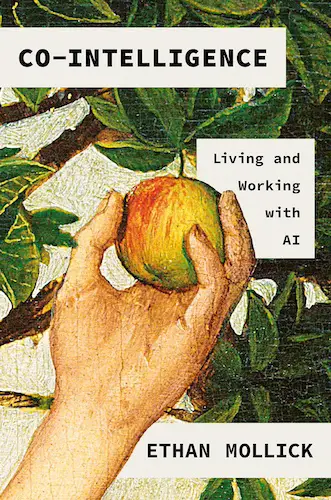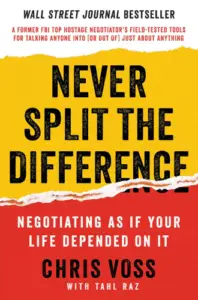Co-Intelligence
Book Author: Ethan Mollick
Summary reviewed by:
Terrence Timmons
Terrence Timmons
Analyst
Bachelor of Arts (BA), University Of California, Santa Barbara 2019
With over 4 years of experience as an analyst. Terrence Timmons is committed to analyzing summaries without compromising on quality.
Co-Intelligence: Summary
What if collaborating with AI could unlock human potential in ways we never imagined? Ethan Mollick’s Co-Intelligence: Living and Working with AI is a guide to thriving in an era where artificial intelligence becomes not just a tool but a partner. The book argues that the future isn’t about replacing humans with AI but amplifying what humans can achieve by working alongside these systems. Mollick calls this partnership "co-intelligence"—a synthesis of human creativity, intuition, and emotional intelligence with AI's speed, precision, and vast processing capabilities.
Mollick contends that the power of AI lies in how we leverage it. While AI is often framed as either a threat to jobs or a revolutionary advancement, Co-Intelligence focuses on the middle ground: AI as a collaborator that redefines how we work, think, and innovate. He suggests that the next frontier of progress requires adapting not just our skills but our mindsets to embrace AI as a co-worker rather than a competitor. This shift, Mollick explains, can enhance creativity, improve decision-making, and foster breakthroughs across industries.
AI as a Creative Partner: AI can augment human creativity rather than stifle it. Mollick shares compelling examples of how AI tools are helping people write, design, and create at levels previously thought impossible.
The Co-Intelligence Framework: The book introduces a practical framework for combining human strengths—empathy, judgment, and adaptability—with AI’s data-driven insights. This blend, Mollick argues, produces outcomes greater than either party could achieve alone.
Workplace Transformation: AI is set to reshape roles across industries, not by eliminating jobs but by changing how work gets done. The book discusses how leaders can prepare teams for this shift, emphasizing the importance of continuous learning and adaptability.
Ethical Challenges: Mollick doesn’t shy away from the ethical concerns surrounding AI. He explores questions about bias, accountability, and the implications of delegating decision-making to algorithms, urging readers to prioritize ethical frameworks in their AI collaborations.
A Vision for the Future: Mollick paints a hopeful picture of a future where co-intelligence leads to unprecedented innovation while addressing societal challenges like inequality, healthcare, and climate change.
Co-Intelligence is not just a book about AI; it’s a manifesto for redefining human capability in the digital age. In a world where fear and hype dominate AI discussions, Mollick offers a balanced and actionable perspective. By framing AI as a collaborative ally, he challenges readers to rethink what they’re capable of achieving when human ingenuity and machine intelligence converge.
This book is for anyone navigating the fast-evolving world of AI—leaders, educators, creatives, and professionals alike. Whether you’re excited about AI’s possibilities or apprehensive about its impact, Co-Intelligence provides the clarity, optimism, and tools you need to thrive. If you’ve ever wondered how AI could transform your work or wanted to understand how to coexist with this powerful technology, this book is an essential read.
Mollick’s engaging style, real-world examples, and actionable advice make Co-Intelligence a standout guide to living and working in harmony with AI.
Co-Intelligence: Genres
Non-Fiction
AI
Artificial Intelligence
Business
Business Strategy
Creativity
Ethics
How To
Leadership
Technology
Co-Intelligence: Main Characters
Human-AI Collaboration: Explores how humans and AI can work together, combining creativity, judgment, and analytical prowess to achieve remarkable outcomes. Real-world cases of co-creation between professionals and AI tools illustrate this concept.
Adaptability and Skill Evolution: Focuses on the necessity of adapting human skills to harness the full potential of AI, with emphasis on lifelong learning and flexibility. Practical advice is provided for integrating AI into workflows.
Ethical AI Use: Examines the moral dilemmas posed by AI, such as accountability for errors, bias in algorithms, and data privacy. Stresses the importance of developing ethical frameworks to guide AI applications.
The Changing Workplace: Discusses how AI is transforming industries, shifting job responsibilities, and creating opportunities for innovation. Highlights the importance of leadership in managing this transition.
The Future of Co-Intelligence: Envisions a world where AI helps address global challenges like healthcare inequality, climate change, and economic disparity.
Co-Intelligence: What You Need to Know
(Contains Spoilers: Perfect for readers seeking a quick review.)
Co-Intelligence: Living and Working with AI provides a roadmap for navigating the AI revolution. Ethan Mollick begins by identifying the transformative potential of AI, framing it not as a competitor to human intelligence but as a partner that complements human abilities. He argues that co-intelligence—a hybrid of human creativity and AI’s computational power—can redefine industries and expand what individuals and teams can achieve.
Mollick offers detailed examples of how AI is already enhancing creative and analytical tasks. He discusses how writers use AI to generate ideas, how designers employ it to streamline processes, and how businesses leverage it to optimize decision-making. These anecdotes showcase the practical benefits of integrating AI into everyday workflows.
The book delves into the challenges of this partnership. Mollick addresses ethical concerns, including the risk of perpetuating bias in AI systems and the need for transparency in AI decision-making. He emphasizes that humans must remain accountable for outcomes, even when AI is part of the process.
In discussing workplace evolution, Mollick describes how AI is changing job roles. He highlights that while some routine tasks are becoming automated, this frees up human workers to focus on creative and strategic endeavors. Leaders are encouraged to foster a culture of adaptability, supporting employees in learning new skills to thrive alongside AI.
The concluding chapters focus on the broader implications of co-intelligence. Mollick envisions a future where AI-human collaboration drives innovation to solve pressing global issues, from climate change to healthcare accessibility. He urges readers to approach AI with optimism and curiosity, recognizing its potential to enhance—not diminish—human capabilities.
Ultimately, Co-Intelligence is a call to action, challenging individuals and organizations to embrace AI as a tool for growth and transformation, ensuring its application aligns with human values and aspirations.
Co-Intelligence: Methodology
This summary is rooted in a deep understanding of Ethan Mollick’s Co-Intelligence, focusing on delivering an engaging and informative experience for readers. By drawing on expert analysis, we highlighted key themes like human-AI collaboration and ethical AI use, ensuring that the book’s insights are clear and actionable. With a focus on practical application, we emphasized how Mollick’s ideas can inspire real-world change, from transforming workplaces to fostering innovation. Finally, our commitment to quality and integrity ensured the summary stayed accurate and accessible, reflecting the book’s essence while providing value to busy readers seeking thoughtful insights.


Co-Intelligence
Date Published: April 2, 2024
Disclaimer: As an Amazon Associate I earn from qualifying purchases.




